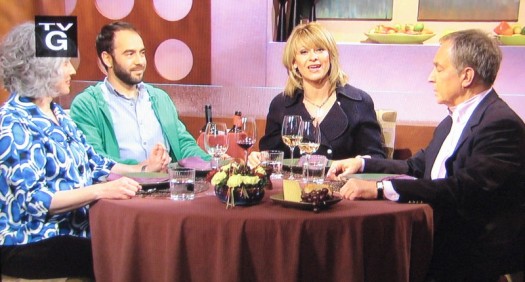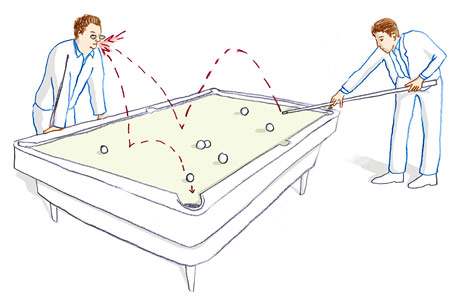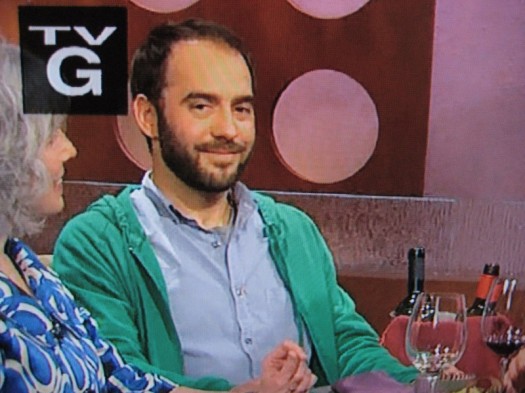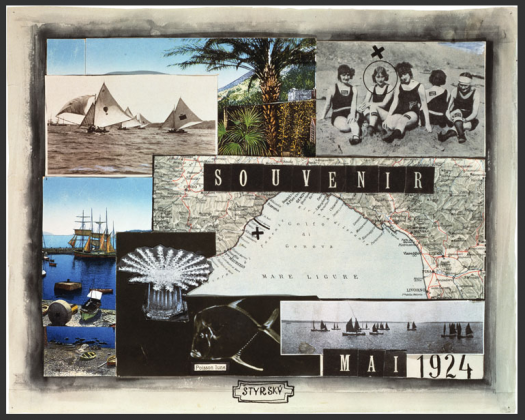New York's blizzard of 1977 makes a riveting cameo appearance in "El Super," an indie (before the term was formalized) film about the hard adjustments that immigrants make in coming to New York. The movie is great for many reasons, but the blizzard steals a few scenes as the main character — a Cuban super — walks around town. Snow is massed on cars, piled high in the streets, and pedestrians stumble through snow-walled sidewalk canyons. Quite a scene, especially in the 70s, when New York looked crumbly and decrepit.Amidst the blizzard, the film is a melancholy document of the lives of Cuban and Puerto Rican immigrants as they reckon with the immensity of New York City and their dismal prospects for work in the bad old days of New York. The dialogue is great, often funny, just as often poignant. Good stuff. I had to resort to extreme measures to find it, but you can buy it on VHS from Amazon. Or you can let me know, and I'll hook you up.Speaking of the blizzard, you may have wondered whether Barney Miller ever dealt with the blizzard. Of course he did. Worth watching just to hear the theme song again.
Category: reviews
Items in which I deliver my opinion of an event, work of art, destination, cuisine, ethnicity, etc.
My pal Greg Gardner is working on some night moves called Secret Seven Records. A few months ago, he released some friendly sounds by Mt. Egypt, and now he's getting ready to drop some more home cooking: The Two Sides of Tim Cohen. It's a solo album by a local rapscallion named Tim Cohen, formerly of Black Fiction, and it's a real nice collection of foggy folk songs. I tend to favor the loose, spacey side of rock music, and this album is open and astral — but with rough edges that reminded me of Panda Bear minus the Beach Boys-ish harmonies. More Floyd, early Floyd. Saucerful of Secrets, soundtrack to "More" Floyd. Whatever the vibe is, it's rough and quiet and psychedelic and probably has British roots. But I'll stop before I say more because it's better than I'm making it sound, and I'll probably be on someone's knuckle sandwich list if I throw around any more crazy notions. I'll attach a song that's more Leonard Cohen, or maybe mellow Replacements, than Floyd, okay?
I've always loved Haruki Murakami. I share his tastes in music — Miles Davis, the Rolling Stones — and I'm easily taken in by his smoky bars, rainy nights, noir pacing, puzzling plot twists, and spare, reserved prose. His books are filled with cool, crisply imagined situations that are eerily layered with shadows and mystery, and that shift subtly between reality and surreality, between the natural and the supernatural. Recently, it was revealed that he is a runner, like me, when he released a book of ruminations on running and its effects on his life and writing. It's called What I Talk About When I Talk About Running, and it is easily in my personal tops of the pops for 2008.There was something about his writing that struck a deep chord with me, but the nature of it was not revealed until he described a specific moment of "passing through" during an ultra-marathon. People talk about "hitting the wall," but, in my experience, running is about hitting many walls, and somehow emerging on the other side.
… Around the 47th mile I felt like I'd passed through something. That's what it felt like. Passed through is the only way I can express it. Like my body has passed clean through a stone wall. At what exact point I felt like I'd made it through, I can't recall, but suddenly I noticed I was on the other side. I don't know about the logic or the process or the method involved — I was simply convinced of the reality that I'd passed through.
Once I read that, I started to remember other moments in Murakami books, moments that all of a sudden seemed to spring from his running experience. For instance, there's a scene in The Wind-Up Bird Chronicle when Boku descends into a well to try to pass through its stone wall to find his missing wife, Kumiko, in a room on the other side of the wall:
I try to separate from myself … I try to get out of the clumsy flesh of mine, which is crouching here in the dark. Now I am nothing but a vacant house, an abandoned well. I try to go outside, to change vehicles, to leap from one reality to another that moves at a different speed. Now a single wall is the only thing separating me from the strange room. I ought to be able to pass through that wall. I should be able to do that with my own strength and with the power of deep darkness in here.
Later, he breaks through.
All of a sudden, I was asleep, as if I had been walking down a corridor with nothing particular on my mind when, without warning, I was dragged into an unknown room. How long this thick, mudlike stupor enveloped me I had no idea. It couldn't have been very long. It might have been just a moment. But when some kind of presence brought me back to consciousness, I knew I was in another darkness.
That sense of being changed "without warning" is so recognizable; I feel like I've been on long runs in which I'm transported suddenly, through time, and dropped somewhere else. And the part about "another darkness" reminded me of After Dark, when Eri Asai has somehow passed from an actual bed to a bed on a TV screen that faces the actual bed, a similar situation in which the rules were somehow totally different:
In the bed in that other world, Eri continues sleeping soundly, as she did when she was in this room — just as beautifully, just as deeply. She is not aware that some hand has carried her (or perhaps we should say her body) into the TV screen. The blinding glare of the ceiling's fluorescent lamps does not penetrate to the bottom of the sea trench in which she sleeps.
All of these make more sense now. It's all about breaking through, about transcending something that is both physical and mental, even spiritual. I also loved Murakami's running mantra: "I'm not a human. I'm a piece of machinery. I don't need to feel a thing. Just forge on ahead." It reminded me of my own mantra, which is the final verse of Johnny Cash's Folsom Prison Blues:
Well, if they freed me from this prison,If that railroad train was mine,I bet I'd move it on a little,Farther down the line,Far from Folsom Prison,That's where I want to stay,And I'd let that lonesome whistle,Blow my Blues away.
Running: It's all about pain, machines, escape, and breaking through walls.
I always meant to write about my close encounter with public television fame — the only kind that's worth pursuing, if you ask me — but somehow I got waylaid by summertime, its various parties and good ol times. But I've got a sec, so I should just spill it before the good times take hold again.
 Time spent combing hair: zero minutes. Time spent ironing shirt: zero minutes. Number of heart attacks my mom would have if she saw this: countless.
Time spent combing hair: zero minutes. Time spent ironing shirt: zero minutes. Number of heart attacks my mom would have if she saw this: countless.
Check, Please! Bay Area is a restaurant review show on our local public television station, KQED Channel 9 (what!). On each show, three Bay Area residents sit around a table and discuss their thoughts and feelings about three local restaurants. At the beginning of the process, each person gets to choose a favorite1 restaurant; then, each participant goes to all three restaurants; THEN, everyone assembles at KQED studios to discuss them in front real TV cameras.
So, yeah, it all started back in June.
Mara and I were at Pauline's Pizza, eating dinner with some friends when we saw Leslie Sbrocco, the host of Check Please. We're Check Please superfans, so we couldn't resist the urge to approach Leslie and creep her out with our extensive knowledge of the show. Later, Leslie and her dining companion (who turned out the be the producer) stopped by our table and asked us to apply to be on the show. Somehow, I was the one who applied, even though Mara would have been 10 times better. Somehow, I was accepted, for reasons that are still unclear to me.As I mentioned in the footnote, I chose a taco truck as my favorite restaurant, and this was a slight — SLIGHT — departure from those chosen by my cohorts — a fancy Noe Valley bistro, and a classic Financial District steakhouse. Therefore, my entire preparation for the show involve crafting arguments about why they needed to give the taco truck another try. "The ecology of taquerias is rich and diverse," I would instruct them; "each one has its own specialty, a thing it does better than all others, and it takes time to fully explore this richness." (Anyway, you can read more of this BS in my review on KQED's website).Turns out, my cohorts loved the taco truck. I was speechless, really. I had nothing productive to say to people who agreed with me. It could have been the wine. (IT'S REAL, by the way). And I drank too much of it, too much for a non-wine drinker, too much for 11am on a weekday (when we taped it), too much to generate extemporaneous bon mots worthy of PUBLIC TV. If you're curious about what the blogosphere had to say about my taco truck recommendation, you need only get a load of this review from a guy named Ely, also from KQED's site:
Dont eat from El Tonayense, I had a beef burrito that made me sick! The meat was too oily and mix in with fatty fat peices. The burrito was tiny and the ingridients had little favor.
My bad.1 Check Please kinda repeatedly implies that each restaurant reviewed is the "favorite" restaurant of the person who suggested it. I chose a taco truck.
I like to tell myself that I don't read stuff like this, but Esquire's got a pretty excellent list of "75 skills every man should master".

33. Hit a jump shot in pool. It's not something you use a lot, but when you hit a jump shot, it marks you as a player and briefly impresses women. Make the angle of your cue steeper, aim for the bottommost fraction of the ball, and drive the cue smoothly six inches past the contact point, making steady, downward contact with the felt. Illustration: Leif Parsons.
There are some good, less predictable skills: 5. Name a book that matters; 21. Argue with a European without getting xenophobic or insulting soccer; 52. Step into a job no one wants to do.And then there are the predictable things:
Drinking-related stuff: 17. Make one drink, in large batches, very well; 24. Know his poison, without standing there, pondering like a dope; 32. Describe a glass of wine in one sentence without using the terms nutty, fruity, oaky, finish, or kick.Outdoors-related stuff: 14. Chop down a tree; 26. Cast a fishing rod without shrieking or sighing or otherwise admitting defeat; 51. Build a campfire; 55. Point to the north at any time; 68. Find his way out of the woods if lost; 69. Tie a knot; 74. Know some birds.Sports-related stuff: 4. Score a baseball game; 11. Swim three different strokes; 65–67. Throw a baseball over-hand with some snap. Throw a football with a tight spiral. Shoot a 12-foot jump shot reliably.
Social context?
I would think that Esquire has made lists like this in the past, and if so I think it would be interesting to compare lists across time. For instance, there's nothing explicitly sports-knowledge-related or steak-knowledge-related — "Have a favorite team," "Know the difference between a New York Strip and a T‑Bone" or something like that — all of which seem like they'd be requirements in the past. It would also be interesting to know if lists like this are recent developments. Would the Esquire magazine of Norman Mailer's era craft a list like this? Probably not, actually. Or, if they did craft lists, they'd be one-item lists: "1. F*** lists."Via BuzzFeed.
Last week I picked up a book called Cop in the Hood by a grad student turned cop (turned academic) named Peter Moskos. He's a law professor now [UPDATE: Oops. He's actually an "assistant professor of Law, Police Science, and Criminal Justice Administration." My bad], but he spent a year policing East Baltimore during his PhD work and wrote a part sociological analysis, part police procedural about his experience. If The Wire had a literary analog, this would be it, not only because it takes place in East Baltimore, but because it presents a morally complex view of the relationship between law enforcement and the citizenry with whom they interact (mostly poor people in desperate circumstances). It also adds academic underpinnings and a truly excellent set of footnotes that provide avenues to a variety of interesting sources, one of which led me to one of my all-time favorite New Yorker articles, a 1998 installment of the Cop Diary called "The Word on the Street" about the language of NYC cops. The author, the pseudonymous Marcus Laffey (actual name: Edward Conlon) recently wrote a memoir called Blue Blood, which is going on the list for sure.I really appreciated his discussion of research methods because it puts in high relief some of the challenges that any researcher (e.g., one who is trying to understand how people use high-tech tools) interacts with their interview subjects. So much of it is very un-objective, and Moskos addresses his skeptics early on:
Some will criticize my unscientific methods. I have no real defense. Everything is true, but this book suffers from all the flaws inherent in ethnographic work … Being on the inside, I made little attempt to be objective. I did not pick, much less randomly pick, my research site or research subjects. I researched where I was assigned. To those I policed, I tried to be fair. But my empathy was to my fellow officers. Those nearest to me became my friends and research subjects. My theories emerged from experience, knowledge, and understanding. In academic jargon, my work could be called "front-and-backstage, multisited, participant-observation research using grounded theory rooted in symbolic interactionism from a dramaturgical perspective.
You can read more in an excerpt here [PDF], and he's got a blog that discusses media coverage of the book here.
I live inside your television
 You may recognize me from somewhere, somewhere like YOUR TIVO.
You may recognize me from somewhere, somewhere like YOUR TIVO.
Pretty much the only thing the director told me: "Don't look at the camera." Dang. More on my explosion onto the local public television restaurant-reviewing stage sometime soon; until then you can check out my episode of the Check Please Bay Area here.

When I was in Washington DC last month, I saw an incredible show at the National Gallery called Foto: Modernity in Central Europe 1918–1945. As you may have guessed by the title, the show is photography-oriented, but it's more than that: It's a story about photography craft, and the way that European photographers bent, broke and otherwise manipulated photos to express the social, political and cultural fragmentation (and chaos) in the wake of the First World War. Most of the artists were unknown to me; they're all introduced and discussed in detail in the excellent exhibition catalogue. It opens at the Guggenheim New York in October.
 This is a photomontage by a Polish artist named Janusz Maria Brzeski. It's called Twentieth-Century Idyll, but the name of the series is even better: A Robot Is Born. Photo: National Gallery of Art.
This is a photomontage by a Polish artist named Janusz Maria Brzeski. It's called Twentieth-Century Idyll, but the name of the series is even better: A Robot Is Born. Photo: National Gallery of Art. Another photomontage, this one by Jindrich Strysky, a Czech artist. Photo: National Gallery of Art
Another photomontage, this one by Jindrich Strysky, a Czech artist. Photo: National Gallery of Art
UPDATE 1: A couple of changed picks; UPDATE 2: Some eerie resemblances my bracket and those of SI writers; UPDATE 4: Surveying the carnage: Thoughts after the first two roundsHere's the bracket that I made on the Monday after the seedings were announced.

UPDATE: Since Monday, I've been spending a lot of time reading up on the teams I don't know/care about — in SI.com and its Tourney Blog, statistical analyst Ken Pomeroy's blog, the NYT Bracket blog, and the ever-unfriendly ESPN.com which must hide a lot of its useful stuff behind its subscription service, Insider. In any case, the more you read about the first round match-ups, the more confusing it all gets. I've seen many of the teams play at some point during the season, but I'm totally in the dark on pretty much any team from the Pac 10 (even though I live in California, I just really can't even force myself to care about it) and almost all of the mid-majors. One bracket change came out of this — I can't believe I'm saying this, but Duke seems less likely to get upset by VCU. Duke has been criticized a lot for being soft, sloppy, and generally uninspired, and they're coming off a stinging loss in the ACC Tournament. How could they not be hungry? They've got a bunch of talented players, and it just seems really unlikely that they won't be able to pull off a win against a VCU team that has only played one team in the tournament (Old Dominion). While I've only changed one outcome, my reading did produce many doubts in my bracket, which I detail below. (It also caused me to create three more versions of my bracket to account for the different scenarios that the pundits highlighted — What if Oregon can't play defense? What if Oden explodes on the scene and dominates everyone? What if North Carolina is as good as they appear to be in 3‑minute stretches?)

UPDATE 2: Incidentally, SI writer Grant Wahl's bracket is almost exactly the same as mine. (Actually, same with Seth Davis). Same Final Four; same final game; same outcome. The only big differences are that he has Texas beating UNC (UPDATE 3: Now, so do I), and Creighton beating Memphis, whereas I have both UNC and Memphis getting knocked out in the next round. (I also have more first-round upsets than him … Oral Roberts over Washington State, etc).UPDATE 4 (in the week following the first two rounds): After two straight years in which my bracket burst into flames during the first weekend, I was just happy to emerge with 15 out of 16 teams still alive. Mostly, I got burned by my late changes — Texas beating UNC and Duke beating VCU — and by the fashionable upsets that I stubbornly decided to stick with — Georgia Tech over UNLV, Creighton over Nevada, and Oral Roberts over Washington State, each of which found their own agonizing way of driving a spear through my heart. Crxp.As usual, there were a couple of teams that I was totally, totally wrong about: (1) UNLV. Obviously, these guys can play. I discounted them because (a) who did they beat? and (b) the coach's son seemed to play an inordinately important role. Both seemed like big-time red flags. I ignored the fact that they were experienced, and that they were clearly pissed off by their #7 seed. Who would have thought that the team that rose to the occasion would be composed of hard-nosed guys led by journeyman coach Lon Kruger (UNLV), and not composed of McDonald's All-Americans and led by the sainted Coach K? Seemed unlikely before it happened, but oh how sweet it is in retrospect. (2) Texas. During the two Kansas games, they were dangerously weak at guard. Both games would likely have been blow-outs if Durant hadn't totally gone off in the first 15 minutes of each. Abrams is a terrible ball-handler who needs multiple screens to get his shot going, and Augustin is completely dominant one moment and out-of-control the next. USC forced these guys to play a bigger role by taking away Durant's dribble; good call, Tim Floyd. (Didn't really think I'd be saying those words anytime after 2002). On the other bench, Rick Barnes made no discernible adjustments. Again, not that surprising, in retrospect.The next round looks mostly boring to me, though I guess half the games could be exciting — UNC-USC, if USC is able to hang on while UNC goes on its periodic runs, A&M‑Memphis should display some good offensive firepower (unlike Pitt-UCLA, which almost certainly will be a grind-it-out snore-fest), and KU-SIU which could be exciting if KU has a hard time running its offense against the defense-minded Salukis. Let's hope that it's not exciting in this way.
Stupid BCS / Viva Boise State!
Question: What do you call it when the richest segment gets to determine all the rules, and they do so in a way that prevents members of the less rich from accessing the advantages available to the rich? A sham? A travesty? Un-American? Ladies and gentlemen, I give you the BCS.After Monday's barn-burning overtime takedown of Oklahoma [watch the legendary fourth-and-18 hook-and-lateral one more time], Boise State provides a slew of new reasons why a more egalitarian post-season schedule makes sense: (1) Obvious Cinderella possibilities. No matter how under-rated they may be at a certain point in time, a team from a "power" conference could never truly be a Cinderella. Who wouldn't want to watch Boise State get a chance to go toe-to-toe with Ohio State? (2) Gun-slinging play-calling. Even if Steve Spurrier would have run the hook-and-lateral on 4th and 18, he would have never called the (modified) Statue of Liberty when going for 2 with the game on the line. Outside of Spurrier's occasional chicanery, you just don't see that kind of stuff, ever, except by inspired teams with nothing to lose; (3) The chance to see a mid-major administer a crushing beatdown to Notre Dame. Enough said.This much is clear: College football is more like professional boxing than like college basketball. Many competitors, many belts, much confusion as to who is champion. For both, impartial regulation would be better for everyone *except* the people who currently run the sanctioning bodies — the WBA, the WBC, the IBF, and the BCS.
